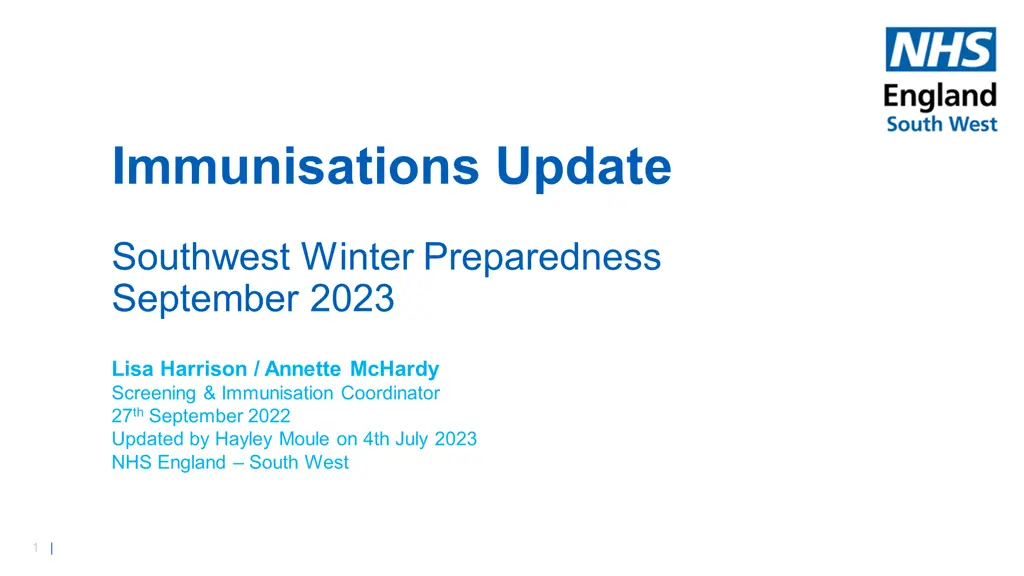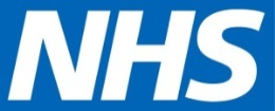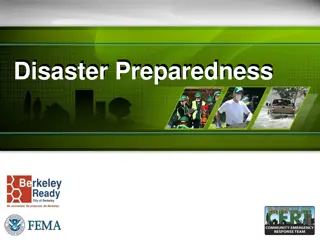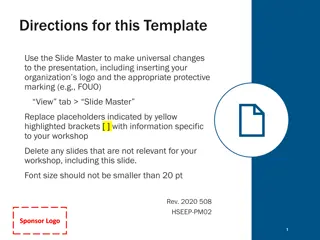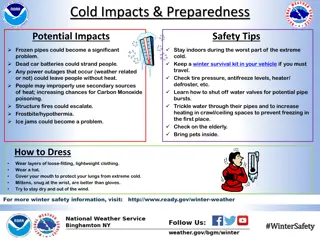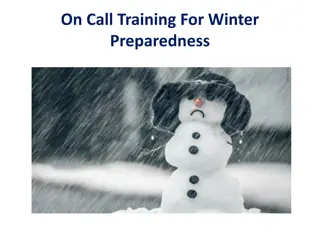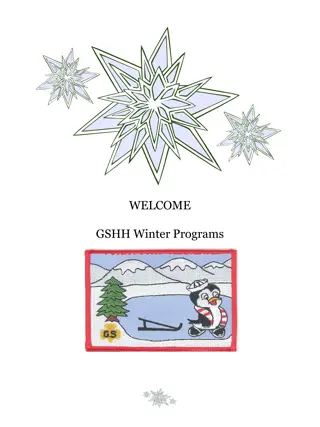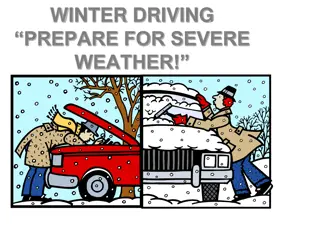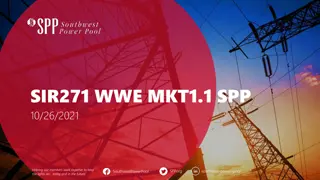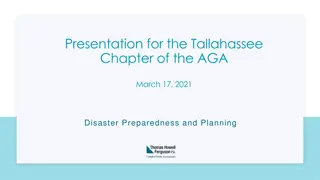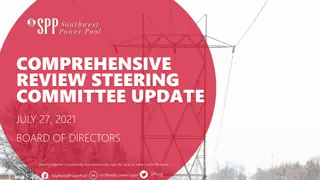Immunisations Update: Southwest Winter Preparedness
Stay informed on Pneumococcal, Shingles, Influenza, and Covid vaccines for 2023/24. Learn about eligible groups, benefits, and resources. Contact the Flu Team for queries and appointments. Protect against serious infections with vaccines.
Download Presentation

Please find below an Image/Link to download the presentation.
The content on the website is provided AS IS for your information and personal use only. It may not be sold, licensed, or shared on other websites without obtaining consent from the author. Download presentation by click this link. If you encounter any issues during the download, it is possible that the publisher has removed the file from their server.
E N D
Presentation Transcript
Immunisations Update Southwest Winter Preparedness September 2023 Lisa Harrison / Annette McHardy Screening & Immunisation Coordinator 27th September 2022 Updated by Hayley Moule on 4th July 2023 NHS England South West 1 |
Thank you On behalf of the NHSE SW Vaccination & Screening Team, thank you and your teams for everything you are currently doing to ensure routine screening and immunisations are delivered despite the difficult current circumstances. Please see the following few slides for potentially useful updates/reminders. 2 |
Pneumococcal, Shingles, Influenza & Covid Vaccines 2023/24 Pneumococcal and Shingles Scene setting - Influenza Eligible groups and target uptake Types of vaccine Key messages Where can social care staff be vaccinated this season Benefits of vaccination for care homes Monitoring uptake Resources for care homes Resources including training and comms 3 |
Flu Team contacts Hayley.moule@nhs.net - Screening + Immunisation Co-ordinator for individuals who are clinically at risk for the Flu programme Please feel free to get in touch. For screening queries and incidents contact the generic inbox: England.swvast@nhs.net For immunisation and Covid queries and incidents contact the Immunisations Clinical Advice and Response Service (ICARS): england.swicars@nhs.net 4 |
The pneumococcal vaccine The pneumococcal vaccine protects against serious and potentially fatal pneumococcal infections. It's also known as the pneumonia vaccine. Pneumococcal infections are caused by the bacterium Streptococcus pneumoniae and can lead to pneumonia, blood poisoning (sepsis) and meningitis. People aged 65 and over only need a single pneumococcal vaccination. This vaccine is not given annually like the flu jab. Pneumococcal polysaccharide vaccine (PPV) is given to people aged 65 and over and people at high risk because they have long-term health conditions. 5 |
Shingles Shingles is caused by the reactivation (generally decades later) of a latent varicella zoster virus infection, more commonly known as chickenpox. Approximately 1 in 4 people will develop shingles during their lifetime. Both the incidence and the severity of the condition increases with age. Older individuals are also more likely to develop secondary complications, such as bacterial skin infections and post-herpetic neuralgia (intractable pain). Up until 31st August 2023: You're eligible for the shingles vaccine when you're aged 70 to 79. When you're eligible, you can have the shingles vaccination at any time of year. There are 2 shingles vaccines available in the UK: Zostavax, a live vaccine given as 1 dose Shingrix, a non-live vaccine given as 2 doses 6 |
Scene setting 22/23 was an above average year for Flu deaths Acute services saw high demand in Autumn/Winter 2022/2023, some of which was caused by Flu cases As well as keeping staff and residents safe and well, reducing the threat of flu and Covid also helps you to ensure business continuity; reducing the likelihood of your staff being ill and off work and the associated costs of providing bank or agency cover for them. Vaccination is also of benefit as it helps to reduce transmission to the wider public and, in times of increased pressure on health and social care services, helps to reduce the burden of ill health, and therefore demand on the wider health system at a time when services are already under pressure. 7 |
Shingles (from 1st September 2023) Replacement of Zostavax (live) with the 2-dose Shingrix vaccine across the entire shingles vaccination programme. Expansion of the immunocompromised cohort to offer Shingrix to individuals aged 50 years and over, with no upper age limit and a period between doses of 8 weeks to 26 weeks. Expansion of the immunocompetent cohort to offer Shingrix routinely to individuals aged 60 years and over, remaining an opportunistic offer up to and including 79 years of age, with a period between doses of 26 52 weeks. The expansion of the immunocompetent cohort will be implemented over two five-year stages as follows: first five-year stage (1 September 2023 to 31 August 2028): Shingrix will be offered to those turning 70 and those turning 65 years of age in each of the five years as they become eligible. second five-year stage (1 September 2028 to 31 August 2033): Shingrix will be offered to those turning 65 and those turning 60 years of age in each of the five years as they become eligible. 8 |
Co-administration of vaccinations We encourage co-administration where possible, but don t wait to give flu/covid if you don t have all the vaccine. Consider if COVID, Shingles and Pneumococcal vaccination can be given at the same time as Flu vaccination noting below: Updates from last year Shingles vaccines can now be co-administered with COVID vaccines. Shingrix can now be co-administered with the adjuvanted influenza vaccine (as well as other types of influenza vaccine) 9 |
Its all about flu! Flu is a viral infection of the respiratory tract (nose, mouth, throat, bronchial tubes and lungs. Flu is spread by germs from coughs and sneezes which can live on hands and surfaces for 24 hours Flu is highly contagious and spreads rapidly in closed communities Most cases in the UK occur during an 8-10 week period during the winter Even people with only mild or no symptoms can affect others The incubation period is around 1-5 days (avg 2-3 days) 10 |
Flu vaccine eligibility 23/24 all children aged 2 or 3 years on 31 August 2023 all primary school aged children (from Reception to Year 6) all secondary school-aged children (years 7-11) commencing vaccinations as early as possible after the flu vaccine becomes available and complete by 15 December 2023 for all school aged children those aged 6 months to under 65 years in clinical risk groups all pregnant women (including those women who become pregnant during the influenza season) those aged 65 years and over those living in long-stay residential care homes or other long-stay care facilities Includes other long-stay care facilities where rapid spread is likely to follow introduction of infection and cause high morbidity and mortality (this does not include, for example, prisons, young offender institutions, university halls of residence) carers in receipt of carer s allowance, or those who are the main carer of an elderly or disabled person close contacts of immunocompromised individuals frontline staff employed by social care providers without employer led occupational health schemes (see flu letter for details) All frontline health care workers, including both clinical and non-clinical staff who have contact with patients 11 |
Frontline health and social care workers All frontline health and social care workers with direct patient/service user contact should be provided with flu vaccination by their employer. This includes staff in all NHS trusts, general practices, care homes, and domiciliary care Employers are encouraged to : Commission a service which makes access to the vaccine easy for all staff Encourage staff to get vaccinated Monitor the delivery of their programme NHS England (NHSE) will continue to support vaccination of social care and hospice workers, with vaccination available through community pharmacy or their registered GP practice 12 |
Flu vaccine available for 2023 to 2024 Posters detailing these available from GOV.UK website: Influenza vaccines for the 2023 to 2024 season (publishing.service.gov.uk) Flu vaccines for the 2023 to 2024 season - GOV.UK (www.gov.uk) 13 | Flu vaccines: 2023 to 2024 flu season - GOV.UK (www.gov.uk)
Where can care/nursing home residents and staff be vaccinated The community pharmacy seasonal influenza advanced service framework has been amended to enable community pharmacies to vaccinate both residential care/nursing home residents and staff in the home setting in a single visit to increase uptake rates GP practices are also able to vaccinate residents and staff who are registered with the practice in the residential/care home Attend a GP or Pharmacy appointment 14 |
Key messages to health and social care workers getting vaccinated against flu and Covid can help protect you, your patients and family everyone is susceptible to flu and Covid, even if you are in good health and eat well you can be infected with the virus and have no symptoms but can still pass on the virus/s to others including patients or residents good infection control measures reduce spread of acute respiratory infections in healthcare settings but are not sufficient alone to prevent them throughout the last ten years there has generally been a good to moderate match between the strains of flu virus in the vaccine and those that subsequently circulated impact of flu on frail and vulnerable patients can be fatal and outbreaks can cause severe disruption in communities, care homes and hospitals The flu vaccine has a good safety record and will help protect you. It cannot give you flu. Having the vaccination can encourage your colleagues to do likewise staff act as positive role models for patients aged 65 and over, those with long-term health conditions and pregnant women to take up the offer too duty of care as professionals to patients or residents to do everything in your power to protect them against infection, including being immunised against flu 15 |
Benefits of vaccination for Care Homes Less staff sickness due to flu / COVID-19 Less chance of needing expensive agency staff Less chance of residents becoming ill Reduced chance of having a flu or COVID-19 outbreak Your employer investing in you 16 |
Monitoring Uptake Keeping records of staff and patients vaccinated How we record and report on vaccination uptake The care home tracker Ensuring that staff GP records are updated to capture social care vaccinations You / your staff may fall into numerous categories, but we need to know that they work in Social Care 17 |
Resources for Care Home Workers Resources including the care home tool kit and training resources for care home workers have been updated for the 2023/24 flu season. When available they can be accessed via the link below The care home tool kit will offer guidance / resources for the following; Information and guidance Employer responsibility Overcoming barriers to vaccination Displaying uptake Links to video materials NICE guidance Useful resources Found here: NHS England South West Influenza 18 |
Resources, including Training and Comms Written Instruction for the administration of seasonal flu vaccination SPS - Specialist Pharmacy Service The first stop for professional medicines advice NHS England South West Patient Group Directions (PGDs) Flu vaccination programme 2023 to 2024: information for healthcare practitioners - GOV.UK (www.gov.uk) UKHSA Campaign Resource Centre - Resources for the autumn/winter campaigns available to order Home - Health Publications (Easy-read and simple text resources can be ordered free of charge from Health Publications) Annual flu programme webpage and the e-learning for healthcare Flu Immunisation web page. UKHSA National flu immunisation programme training slideset 19 |
Links to other key documents Green Book Influenza chapter Joint Committee on Vaccination and Immunisation National Institute for Health and Care Excellence (NICE) guidelines on increasing influenza vaccine uptake NHS England Public Health Commissioning information ImmForm survey user guide for GP practices, local NHS England teams, and NHS Trusts Flu vaccine uptake figures Flu immunisation Patient Group Direction (PGD) templates ImmForm website for ordering child flu vaccines UKHSA Information for healthcare practitioners about the flu vaccination programme Vaccine update UKHSA monthly newsletter UKHSA flu immunisation programme Shingles (herpes zoster): the green book, chapter 28a - GOV.UK (w.gov.uk) Pneumococcal: the green book, chapter 25 - GOV.UK (www.gov.uk) 20 |
Covid-19 vaccination programme resources COVID vaccination Information for Health Professionals guidance can be found at https://www.gov.uk/government/publications/covid-19-vaccination-programme-guidance-for- healthcare-practitioners Green book, chapter 14a: https://www.gov.uk/government/publications/covid-19-the-green-book-chapter-14a NHS encourages pregnant women to get COVID-19 vaccination https://www.england.nhs.uk/2021/10/nhs-encourages-pregnant-women-to-get-covid-19- vaccine/ Vaccination programme resources: https://www.gov.uk/government/collections/covid-19-vaccination-programme Health publications order site: https://www.healthpublications.gov.uk/Home.html Patient group direction (PGD): https://www.gov.uk/government/collections/immunisation-patient-group-direction-pgd South West PGDs https://www.england.nhs.uk/south/info-professional/pgd/south-west/downloads/ 21 |
